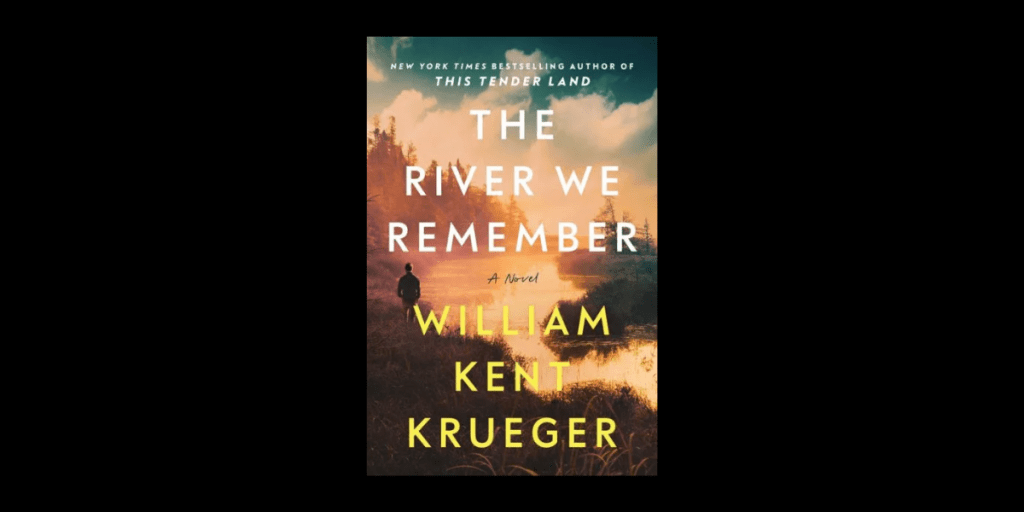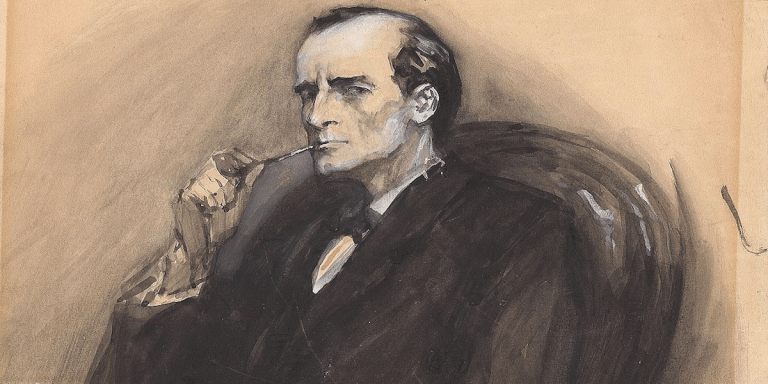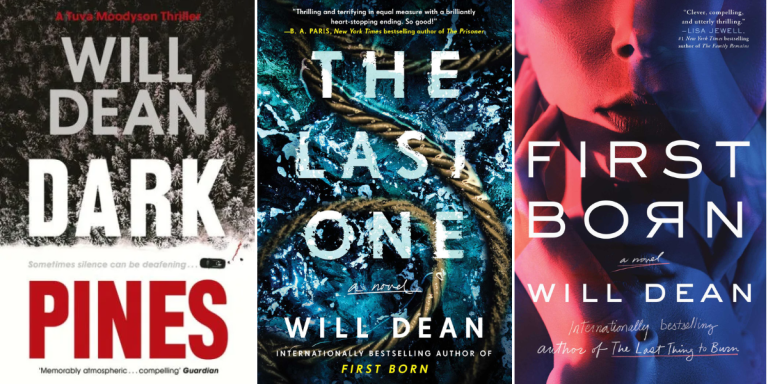Read the Excerpt: The River We Remember by William Kent Krueger

PROLOGUE
THE ALABASTER RIVER cuts diagonally across Black Earth County, Minnesota, a crooked course like a long crack in a china plate. Flowing out of Sioux Lake, it runs seventy miles before crossing the border into Iowa south of Jewel, the county seat. It’s a lovely river filled with water that’s only slightly silted, making it the color of weak tea. Most folks who’ve grown up in Black Earth County have swum in the river, fished its pools, picnicked on its banks. Except in spring, when it’s prone to flooding, they think of it as an old friend. On quiet nights when the moon is full or nearly so and the surface of the Alabaster is mirror-still and glows pure white in the dark bottomland, to stand on a hillside and look down at this river is to fall in love. With people, we fall in love too easily, it seems, and too easily fall out of love. But with the land it’s different.We abide much. We can pour our sweat and blood, our very hearts into a piece of earth and get nothing in return but fields of hail-crushed soybean plants or drought-withered cornstalks or fodder for a plague of locusts, and still we love this place enough to die for it. Or kill. In Black Earth County, people understand these things. If you visit the Alabaster at sunrise or sunset, you’re likely to see the sudden small explosions of water where fish are feeding. Although there are many kinds of fish who make the Alabaster their home, the most aggressive are channel catfish. They’re mudsuckers, bottom feeders, river vultures, the worst kind of scavengers. Channel cats will eat anything.
This is the story of how they came to eat Jimmy Quinn.
CHAPTER ONE
IN 1958, MEMORIAL Day fell on a Friday. This was long before the federal government made the celebration officially the final Monday of May. Back then it was still referred to as Decoration Day. Like many rural communities, Jewel took its holidays seriously. The people of Black Earth County were mostly farmers, sensible, hardworking folks. Their days were long, their labor backbreaking. But when they could legitimately give themselves permission to relax and enjoy life, they did a pretty fair job of it. Decoration Day was the first real celebration after the relentless work of spring. By then, the ground had been plowed, harrowed, planted. The honey wagons had spread manure across the seeded fields, and near the end of May, that aroma, which is a peculiar hallmark of farm country, had pretty much disappeared. In its place was a different scent, the fragrance of green shoots and leafed trees and early-blooming wildflowers and, in town, lawns freshly mowed. What had come by the end of May was the smell of promise.
Jewel had always called itself “The Gem of the Prairie.” The grand courthouse on the hill was built twenty years after the Civil War, constructed of granite quarried in the Minnesota River Valley seventy miles north. The shops that lined the main street were all family-owned, and proudly so. It was a small town by most standards. There were no stoplights and the only grocery store was Huber’s, in business since before the turn of the century. If you came from the city, you’d probably have thought of it as sleepy. But in 1958, it was bustling, with lots of life in it. And death, too, as it turned out.
The Decoration Day parade was a grand affair. The veterans dressed up in their uniforms. The oldest was Gunther Haas, who served with Colonel James W. Forsyth’s 7th Cavalry at the battle of Wounded Knee in 1890. The uniforms of the old vets were generally faded and ill-fitting, but a lot of the younger men, who’d fought in World War Two or the Korean War, still looked pretty snappy in their khaki and braid or their navy whites. The veterans were at the center of the parade, Gunther Haas among them, pushed along in his wheelchair, a frail wisp of a man with ill-fitting false teeth and barely enough strength to wave the little flag he held. Up front marched the Jewel High School Band in its final official performance of that school year. The fire department, as it did for every parade, rolled out its two engines and hit their sirens many times along the route, so that the spectators on the sidewalks screamed with delight. Jack Harris, the mayor, was there in a shiny red Edsel convertible that Wheeler’s Ford dealership was still trying to get rid of. Near the end came the Black Earth Trotters, a group of local show riders, on their mounts, the horses decked out in ribbons and high-stepping proudly. The parade moved down the entire length of Jewel’s business district—three blocks of shops and businesses—and turned at the corner of Main and Ash, where chairs had been set on a high platform so that Harris and a few others could speak, offering the kinds of platitudes expected on such a day. Afterward, in Veteran’s Park, there would be picnics and fireworks. In those days, Jewel’s population hovered around four thousand.
A lot of them turned out for the celebration, and a good many farm families came into town as well. Absent that year, as usual, was Brody Dern, sheriff of Black Earth County. Brody would have been among the most decorated of veterans had he chosen to march with the others, but Brody never did. He had duties to attend to, he would say as an excuse, and folks let it go at that.
On the Decoration Day when this story begins, Brody was, in fact, occupied overseeing the one prisoner the county jail held, Felix Klein. Felix wasn’t the kind of man who needed much oversight. When he was sober, he was every bit as decent and peace-loving as the next citizen of Jewel. But Felix had demons inside him, or so he claimed when he’d been hitting the Wild Turkey, and these demons sometimes made him do things he regretted. He tried to set fire to the water tower once. When he sobered up and Brody demanded an explanation, Felix was stumped. And late on the previous New Year’s Eve, Brody had found him wandering Jewel in his long johns, his feet bare. Brody had taken him to the emergency room of the little hospital, where, because of frostbite, they’d had to amputate a couple of toes on both feet. When Brody questioned him, Felix said he couldn’t stand to be in his house any longer, not with Hannah there, crying like that. Hannah was Felix’s wife. By then, she’d been dead a dozen years.
But get him off the bottle and Felix was a man who could carry his own in an intelligent conversation, and he was one hell of a chess player.
That’s precisely what he and Brody were doing that afternoon when the Decoration Day parade was taking place on Main Street. Brody could hear the high school band and the cheers and the applause of those who’d gathered to watch, and now and again he heard the fire engine sirens. Later, when everything had moved to Veteran’s Park, he planned to join his brother’s family and his mother for some cold fried chicken. But at that moment, he was content to be right where he was.
Hector, Brody’s golden retriever, lay on the floor not far from the men. Brody had named him for the noble hero of Troy, and when you looked into that beautiful dog’s soulful brown eyes you knew why.
The sheriff was thirty-five years old, tall and lean. His hair was the color of acorns. He wasn’t handsome, not in the way of Hollywood. In fact, the Amish of the neighboring county would probably have called him very plain and meant it as a high compliment.
With his queen, Brody had just checked Felix’s king and had lifted his coffee mug for a sip when the door to the jailhouse burst open and Herman Ostberg rushed in, breathless.
Brody and Felix looked up from the chessboard, and Hector sprang to his feet. Ostberg was a small, excitable man. For several moments, he just stood there panting, his eyes opened impossibly wide.
“Brody,” the little man managed when he finally caught his breath. “You’ll never guess.”
“No,” Brody replied. “I don’t suppose I will.” “Jimmy Quinn,” Ostberg gasped.
“What about Quinn?”
“The catfish,” Ostberg said. Then said again, “The catfish.”
Brody was a man who’d seen things in war that had inured him to the shock of normal emergencies in a place like Jewel. No one knew the details of his war experiences but they knew of the medals. To settle the little man, Brody said, “Take a deep breath, Herman, then tell me about Quinn and the catfish.”
Ostberg stared at the two men, one on either side of the chessboard, tried to calm himself, and finally, as if he couldn’t quite believe his own words, said,“They ate him, Brody. They ate him right down to the bone.”
CHAPTER TWO
“WHO’S THEY, AND who did they eat?”
The question came from Sam Wicklow, standing in the open doorway behind Ostberg. Wicklow was publisher and editor of the Black Earth County Clarion, a twice-weekly newspaper. He was dressed in a light blue denim shirt and khaki pants. He sported a full beard, something not many men did in the nineteen fifties, unless they were Amish or beatniks or Ernest Hemingway. Wicklow’s facial hair gave him a gruff countenance, which was not at all the truth of who he was but came in handy when he had to defend an unpopular editorial or ask a hard question in pursuit of a story. Mostly he wore the beard to cover up some of his scars. He had a lot of them, all over his body. He’d been blown nearly apart on Iwo Jima, but the army doctors were able to sew him back together, except for the lower part of his left leg, which was scattered in pieces across a tropical hillside. He walked with a prosthetic attached to the stump of his knee, which gave him a stiff, awkward gait. On occasions that required him to attempt to run, he was sadly comic. He’d been taking pictures of the parade, and his Leica camera hung from a strap around his neck.
“Those damn channel cats in the Alabaster,” Ostberg said. “They pretty near ate up Jimmy Quinn.”
Felix Klein, interrupted in mid-move, still held in his hand the bishop he intended to use to defend his threatened king. “Where?” he asked.
“Near the bridge on County Seven.”
“Good fishing under that bridge,” Felix noted. “Nice deep water there.”
“Quinn’s dead?” Brody said.
“Hell, yes, he’s dead,” Ostberg said. “Ain’t no living man going to let channel cats feast on his insides.”
“You found him?”
“Not half an hour ago. I was planning on fishing. Then I spotted this jumble of driftwood kind of nudged up against the bank. And right there in the middle of it was Quinn. Or what’s left of him.”
“You’re sure it’s Quinn?”
“Them channel cats pretty near chewed off his face, but even so, he’s a man it’s hard not to recognize.”
“You can show me where?” Brody rose from the small table on which the chessboard sat.
“I sure can.”
“I’d like to come along,” Wicklow said.
Without bothering to think about it much, Brody said, “All right.” He went to the radio and tried unsuccessfully to raise his deputy, Asa Fielding, then looked back at his chess partner. “I’m going to have to put you back in your cell, Felix.”
“I’d like to come, too,” Felix said.
“I’ll tell you all about it when I get back.”
Brody pulled a ring of keys from a drawer in the office desk and led Felix through a metal door to the cellblock. Because his missing toes made balance a little precarious, Felix walked carefully to the cell, where he’d slept the night before after Brody had brought him in for being drunk and urinating in public in front of the Alabaster Inn. Felix couldn’t go before a judge on a charge until court convened following the holiday weekend, so the cell was his temporary home. Which was not uncommon.
“You’re proposing to leave me here alone?” Felix said. “No choice,” Brody replied.
“And what if there’s a fire and I’m locked up?” “The building is brick, Felix.”
“Wooden floorboards and joists,” Felix pointed out. “Felix . . .” Brody began.
“Lots of wood furniture in this place. And you know yourself, Brody, that most deaths in fires are caused not by burns but smoke inhalation. You want that on your conscience?”
“All right, all right,” Brody said, because he didn’t want to keep arguing. “But stay out of my way.”
Through the open window in the east wall came sunlight and a summer breeze and the sounds of the celebration. Brody thought about his deputy, who was walking the parade route, helping to maintain order. He considered whether he should wade into things and let Deputy Fielding know what was up. But that would mean he’d have to endure a lot of handshaking and backslapping and questions about why he was not in his army uniform and marching with the other vets, things he wanted no part of.
Back in the office, he found Herman Ostberg perusing the wanted posters and notices tacked to the bulletin board that hung on the wall. Sam Wicklow stood at the opened doorway of the jailhouse, staring outside down the street toward the hoopla. Wicklow was another man who opted not to walk with the veterans in the yearly parade. Brody wondered if it was because Wicklow was self-conscious about his awkward gait or if, like himself, he simply found the whole thing uncomfortable. He’d never asked. He figured he probably never would. A man made his own choices for his own reasons, and unless any of those choices put him in opposition to you, you simply let them be.
Brody wrote a note to Asa Fielding and left it on the desk. While he wrote, he said,“You parked out front, Herman?”
“Yeah. My truck.”
“Go on out. We’re right behind you.”
When Ostberg had left, Brody said, “You just happen to be here at the right time, Sam? Happy coincidence?”
Wicklow shook his head. “Saw Ostberg speed into town behind the parade going way too fast. He almost clipped the rear end of the Co-op float. I watched him cut up Cottonwood Street and head toward your office. I thought it was worth the trouble of following.”
“Jimmy Quinn,” Felix said. “If it’s true what Ostberg says, feeding those catfish is just about the only unselfish thing that man ever did.”
“Come on, Hector,” Brody called to his dog. To Sam Wicklow and Felix Klein he said,“Let’s go see for ourselves what the truth is.”
Caught up in the torrent of anger that sweeps through Jewel are a war widow and her adolescent son, the intrepid publisher of the local newspaper, an aging deputy, and a crusading female lawyer, all of whom struggle with their own tragic histories and harbor secrets that Quinn’s death threatens to expose.
Both a complex, spellbinding mystery and a masterful portrait of midcentury American life from an author of novels “as big-hearted as they come” (Parade), The River We Remember is an unflinching look at the wounds left by the wars we fight abroad and at home, a moving exploration of the ways in which we seek to heal, and a testament to the enduring power of the stories we tell about the places we call home.
By clicking 'Sign Up,' I acknowledge that I have read and agree to Hachette Book Group’s Privacy Policy and Terms of Use


